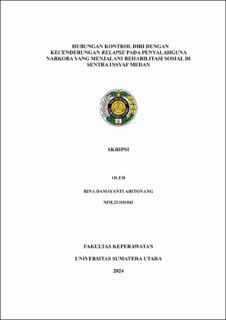Hubungan Kontrol Diri dengan Kecenderungan Relapse pada Penyalahguna Narkoba yang Menjalani Rehabilitasi Sosial di Sentra Insyaf Medan
The Relationship between Self-Control and Relapse Tendency in Drug Abusers Undergoing Social Rehabilitation at Sentra Insyaf Medan

Date
2024Author
Aritonang, Rina Damayanti
Advisor(s)
Nasution, Mahnum Lailan
Metadata
Show full item recordAbstract
Drug abuse is a major and alarming challenge. One of the most common issues associated with drug abuse is repeated use, also known as relapse. Sel control is a crucial factor that needs to be considered and improved to prevent relapse in drug abusers. This study aims to identify the relationship between self-control and relapse tendency in drug abusers undergoing social rehabilitation at Sentra Insyaf Medan. The study employs an analytical correlational design using the Spearman statistical test, with a sample of 98 drug abusers selected through purposive sampling. Data collection was conducted using questionnaires. The results of the study indicate that the self-control level of drug abusers at Sentra Insyaf Medan falls into the low category, with 39 respondents (39.8%), while relapse tendency is categorized as high in 41 respondents (41.8%). The study findings show a negative relationship between self-control and relapse tendency, meaning that the higher the self-control, the lower the relapse tendency. The Spearman test results revealed a p-value of 0.001 (<0.005) and an r-value of -0.564. It is recommended that rehabilitation programs be enhanced to develop self-control, emotional management, and decision-making skills to prevent relapse among drug abusers.
Collections
- Undergraduate Theses [1279]
